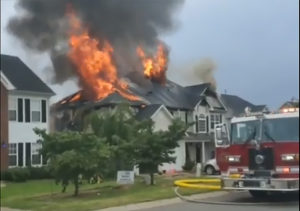 According to the state law in North and South Carolina, firefighters diagnosed with cancer not covered by benefits have to go through insurance to pay for their medical bills without getting the opportunity to collect workers’ compensation, including the benefits for disability.
According to the state law in North and South Carolina, firefighters diagnosed with cancer not covered by benefits have to go through insurance to pay for their medical bills without getting the opportunity to collect workers’ compensation, including the benefits for disability.
Following the national effort to extend the health benefits for first responders on 9/11, local firefighters in Charlotte, a major commercial hub in North Carolina, are calling attention to this issue at a local level.
Who is Eligible?
In 33 other states, firefighters with various types of cancer are eligible for the benefits as the law presumes that these workers got the disease via occupational exposure.
Three years ago, a Charlotte firefighter, Seth Tinsley, who passed away at the early age of 34 due to brain cancer, was written as one of those that lost their lives in the line of duty in Colorado. His state refused to draw the connection between his eleven years of service and his death.
This is primarily due to the state’s 2016 law limitation that only allows three types of cancers eligible for the benefits—intestinal, mesothelioma, and testicular. NC lawmakers only added esophageal cancer back in 2017.
Since then, Charlotte and other NC firefighters’ associations are urging lawmakers to add five more forms of the illness into the list, including the brain, oral, rectal, multiple myeloma, and non-Hodgkin lymphoma.
In 2017, while bills to extend more types of cancers into the state’s line-of-duty cancer list have been proposed in the state’s House and Senate, the bills never got the floor votes in spite of having plenty of co-sponsors.
A Case Study
Jason Barringer, a local firefighter in Charlotte, knew all along that his job would undoubtedly come with a specific risk. Still, he would never have imagined that cancer, specifically non-Hodgkin’s lymphoma, would be a part of this risk.
Barringer has been diagnosed with stage two cancer and went through chemotherapy treatment. He told FOX46 Charlotte that revealing this heart-breaking news to his family was one of the hardest things.
Barringer stated that firefighters are covered in soot after the fire, which contains carcinogens. He further revealed that the penetration of harmful substances into their skin was the reason why they develop various kinds of cancer.
The Centers for Disease Control and Prevention publicized that arsenic, asbestos, and formaldehyde are some of the potential carcinogens found in smoke, as recognized by the National Institute for Occupational Safety and Health (NIOSH).
In 2010, with funding assistance from the United States Fire Administration, a multi-year study was conducted by NIOSH researchers to determine the effect of occupational exposure on firefighters. Researchers wondered whether these workers have a higher risk of being afflicted with cancer or other fatal diseases due to the nature of their job.
The study involving 30,000 firefighters showed that higher rates of mouth, lung, bladder, and gastrointestinal cancer-related deaths were present amongst these workers compared to the general US population.
Risk of Being a Firefighter
Moreover, there were approximately twice as many firefighters diagnosed with malignant mesothelioma, which is a rare type of cancer due to asbestos exposure. Younger firefighters, who were under 65 years old, are shown to have more bladder and prostate cancers.
The risk of firefighters dying due to lung cancer increases as they spent more time in the fires. Firefighters also have a higher chance of getting leukemia with the higher number of fire runs.
Furthermore, the International Association of Fire Fighters revealed that in North Carolina alone, there are nine cancer-related deaths amongst the members each year. This figure did not even include the deaths of the volunteers, who would comprise up to 70% of the state’s total firefighters.
These findings are the reason why the other 33 states enforce presumptive regulation covering firefighters for certain types of cancers under worker’s compensation.
Nevertheless, though the NC Industrial Commission allows death benefits of up to $100,000 for firefighters, police officers and the rescue squad who died while on duty, have only granted benefits twice for firefighters who died of cancer.
Now cancer-free, Barringer believes that firefighters in this state deserve help from a workers comp lawyer, as they are risking their lives in place of others’ well-being.
The Charlotte Fire Department has also encouraged cancer awareness, following the initiative of the Levine Cancer Institute’s Code T.O.M across the state that aims to help firefighters learn their risk of cancers as well as the disease’s early signs and symptoms. A cancer task force had been established within the department several years ago.


